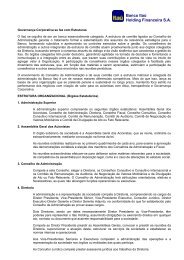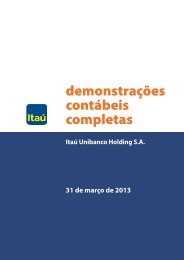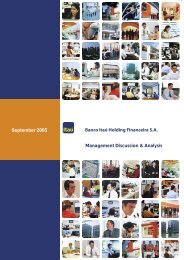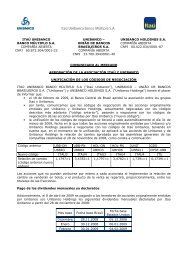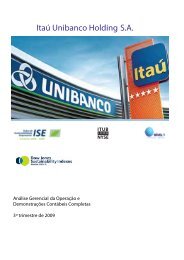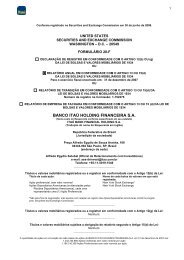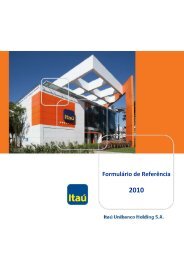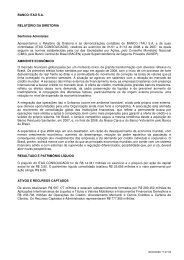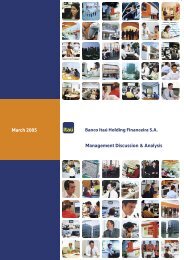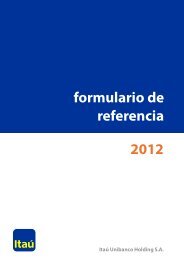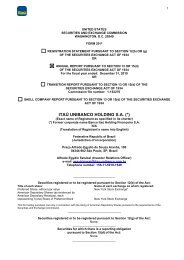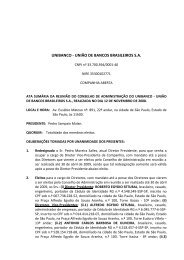Relationships - Banco Itaú
Relationships - Banco Itaú
Relationships - Banco Itaú
You also want an ePaper? Increase the reach of your titles
YUMPU automatically turns print PDFs into web optimized ePapers that Google loves.
Corporate Governance<br />
• Governance Structures<br />
• Transparency in Reporting<br />
• Socio-environmental Risk<br />
• Crisis Management<br />
• Ethics Management<br />
Projects evaluated and financed by <strong>Itaú</strong> BBA<br />
Other projects approved 1 by <strong>Itaú</strong> BBA<br />
using Equator Principles criteria - 2009 1 using Equator Principles criteria – 2009<br />
Sectors<br />
Projects<br />
Investments<br />
<strong>Itaú</strong> BBA’s<br />
(in R$ millions)<br />
share<br />
Sectors Projects<br />
Investments<br />
(in R$ millions)<br />
(in R$ millions)<br />
Energy 4 23,970.42 949.79<br />
Services 1 1,810.38 660.40<br />
Total 5 25,780.80 1,610.20<br />
Sectors<br />
Projects<br />
Investments<br />
(in R$ millions)<br />
<strong>Itaú</strong> BBA’s<br />
share<br />
(in R$ millions)<br />
A 3 25,529.40 1,470.41<br />
B 2 251.40 139.79<br />
Total 5 25,780.80 1,610.20<br />
1. Projects in this table were financed during 2009, and were approved by the governance structure in 2009<br />
or in previous years.<br />
<strong>Itaú</strong> BBA’s<br />
share<br />
(in R$ millions)<br />
Energy 2 1,993.55 722.00<br />
Services 1 214.00 30.00<br />
Total 3 2,207.55 752.00<br />
Sectors<br />
Projects<br />
Investments<br />
(in R$ millions)<br />
<strong>Itaú</strong> BBA’s<br />
share<br />
(in R$ millions)<br />
A 1 1,386.00 323.00<br />
B 1 214.00 30.00<br />
C 1 607.55 399.00<br />
Total 3 2,207.55 752.00<br />
1. Projects in this table were approved by the governance structure in 2009, but by year-end still had not been<br />
financed, and therefore were not included in the previous table.<br />
Socio-environmental Risk<br />
The Equator Principles cover, among<br />
other issues, the following:<br />
• protection of human rights and<br />
community health, safety and security;<br />
• protection of cultural property and<br />
heritage;<br />
• land acquisition and involuntary<br />
resettlement;<br />
• impacts on indigenous peoples, and their<br />
unique cultures, systems and values;<br />
• pollution prevention and waste<br />
minimization, pollution controls and solid<br />
and chemical waste management;<br />
• sustainable management of natural<br />
resources and biodiversity; and<br />
• employment conditions.<br />
We are committed to improving our<br />
environmental risk management through<br />
in-depth studies of our credit operations.<br />
Accordingly, we seek to establish longer<br />
lasting relationships with customers and<br />
other stakeholders in order to consolidate<br />
a new stance in the financial market,<br />
one which promotes and is capable of<br />
multiplying good socio-environmental<br />
practices.<br />
Equator Principles<br />
We are in the leadership position for the<br />
Equator Principles worldwide. We were<br />
appointed to chair its Steering Committee<br />
on September 23, 2008, becoming the<br />
first financial institution from an emerging<br />
economy to take on this post, where we will<br />
remain until March 15, 2010. We were the<br />
unanimous choice of the member banks<br />
of the Committee, due to the commitment<br />
we have displayed in applying the Equator<br />
Principles criteria to project analysis, as well as<br />
the conduct of our Socio-environmental Risk<br />
Policy for Corporate Credit, which is based on<br />
voluntary compliance with global initiatives<br />
and accepted environmental standards,<br />
policies, guidelines and procedures.<br />
Being at the forefront of this challenge<br />
allows us to consolidate and disseminate<br />
our experience in socio-environmental risk<br />
management policies. In October 2009, for<br />
example, in partnership with the International<br />
Finance Corporation (IFC) - the World Bank<br />
arm for financing private investments -<br />
and other bank members of the Steering<br />
Committee of the Equator Principles, we<br />
led the discussions in London as part of the<br />
consultation and review process of the IFC’s<br />
Performance Standard.<br />
Financial institutions that decide to<br />
voluntarily join the Equator Principles commit<br />
to set and use socio-environmental criteria<br />
when granting loans for projects whose<br />
total value equals or exceeds US$10 million<br />
(Project Finance operations, as defined in<br />
Basel II), in addition to criteria established for<br />
Performance Standards by the IFC and the<br />
Health, Safety and Environment Guidelines<br />
defined by the World Bank, which are<br />
recognized worldwide.<br />
38 <strong>Itaú</strong> Unibanco Holding S.A.



